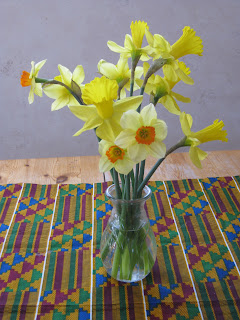Church bells are impressive items. They're huge, for one, often as tall as an adult human, and they weigh a ton - literally. And up close, they're so loud they can kill you; at least that's what Dorothy L. Sayers says in The Nine Tailors, where Lord Peter barely escapes with his life when he is accidentally caught in a church tower while the bells are tolling. I believe her - I was on top of a church tower once when the bell struck the hour, and even though we were a floor or two above the bell (or below, I can't remember), we all stood there with our hands pressed over our ears, the noise was so painful. But bells have to be that loud, so they can be heard in the whole town. Else how would you know when it's time to go to church or take your lunch break, or when someone is getting married or buried or christened or anything else important happens? Church bells were the Twitter and Google Calendar of pre-technology days.
 |
| My lovage doing its spring thing |
Over here in the New World, church bells are few and far between; I have never lived within the sound of bells here. But I do get to have the flower kind of Easter Bells, and they make me happy.
And on that note, some other things that make me happy are rhubarb, lovage, and chives - the first food crops that start poking their heads out of the ground. I love snow drops and crocuses, because they say that winter is nearly over and spring is here, but it's those green needles of the chive shoots and the red bump of sprouting rhubarb that put the full stop behind that statement. Winter is done. Now when I make soup I don't have to stint on dried lovage any more in order to avoid running out - the new crop is growing, and within a few months that lovage bush is going to be taller than I am and I'll be hacking back the celery-flavoured greenery to keep it from choking out its neighbours in the vegetable bed.
 |
| Rhubarb rhubarbing |
Life, the Universe, Easter Bells and Things That Make Me Happy. Have a wonderful spring!

